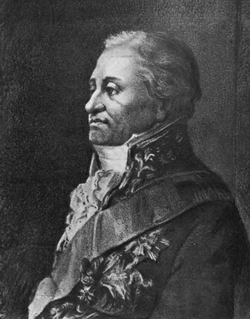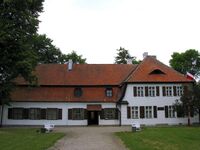History:Józef Wybicki
Józef Wybicki | |
|---|---|
 | |
| Coat of arms | |
| Known for | Author of the Polish national anthem "Mazurek Dąbrowskiego" |
| Born | Będomin, Pomerania, Poland |
| Died | 10 March 1822 (aged 74) Manieczki, Prussia (now Poland ) |
| Buried | Church of St. Adalbert, Poznań |
| Noble family | Wybicki herbu (coat of arms) Rogala |
| Spouse(s) | 1. Kunegunda Wybicka, née Drwęska (1773–1775) 2. Estera Wybicka, née Wierusz-Kowalska (1780) |
| Father | Piotr Wybicki |
| Mother | Konstancja Wybicka, née z Lniskich |
Józef Rufin Wybicki (Polish pronunciation: [ˈjuzɛv vɨˈbit͡skʲi]; 29 September 1747 – 10 March 1822) was a Polish nobleman, jurist, poet, political and military activist of Kashubian descent.[1] He is best remembered as the author of "Mazurek Dąbrowskiego" (English: "Dąbrowski's Mazurka"), which was adopted as the Polish national anthem in 1927.
Life
Wybicki was born in Będomin, in the region of Pomerania in the Polish–Lithuanian Commonwealth.[2] His family was Pomeranian nobility.[3]
He finished a Jesuit school, and in his youth was a junior court official.[3] In 1767, he worked at the Crown Tribunal in Bydgoszcz.[4] Wybicki was elected a deputy to the Repnin Sejm, the session of Polish parliament in 1767, on the eve of the First Partition of Poland.[2] Subsequently, he joined the insurgency known as the Confederation of Bar (1768–1772), aimed at opposing the Russian influence and king Stanisław August Poniatowski.[2][3] He was one of the advisors (konsyliarz) of the Confederacy, acting as a diplomat.[5] After the failure of the uprising, he spent some time in the Netherlands, studying law at Leiden University.[3]
Returning to Poland, in the 1770s and 1780s he was associated with the Commission of National Education.[2] He supported King Stanisław August Poniatowski and his proposed reforms.[2][3] He helped draft the liberal Zamoyski Codex of laws of the late 1770s.[6] He was a Patriotic Party activist during the Great Sejm (1788–92) – though he was not one of its first deputies, during much of that time staying at his estate, writing and staging operas.[2][3] He did, however, participate in the Great Sejm's deliberations, beginning in 1791.[6] In 1792, in the aftermath of the Polish–Russian War of 1792, like many of Poniatowski's supporters, he joined the Targowica Confederation.[7]
He participated in the Kościuszko Uprising (1794)[2] and was a member of the Military Section of the Provisional Council of the Duchy of Masovia.[8] During the uprising, he co-organized the Polish administration in the liberated city of Bydgoszcz.[4] After the failure of this insurrection he moved to France.[3]
He was a close friend of both Tadeusz Kościuszko and Jan Henryk Dąbrowski.[9] With Dąbrowski he organized the Polish Legions in Italy, serving under Napoleon Bonaparte.[2] In 1797, while in Reggio Emilia, Italy, he wrote Mazurek Dąbrowskiego (Dąbrowski's Mazurek).[2] In 1806 he helped Dąbrowski organize the Greater Poland Uprising.[3]
After the creation of the Duchy of Warsaw in 1807, he held a number of positions in its Department of Justice, and continued working for it after the Duchy's transformation into Congress Poland.[3] In 1817 he became president of the Supreme Court of Congress Poland.[10]
He died on 10 March 1822 in Manieczki, then part of the Grand Duchy of Posen in the Prussian Partition of Poland.[2]
Works
Wybicki was a writer, journalist and a poet.[2] He wrote political-themed poems, plays and political treaties advocating reforms in Poland in the 1770s and 1780s.[2][3] His works of that time analyzed the Polish political system, the concepts of liberty, and advocated for more rights for the peasantry.[11] He would also publish more political brochures in the 1800s, advocating for liberal reforms in the Duchy of Warsaw.[3]
Mazurek Dąbrowskiego (Dąbrowski's Mazurka) remains Wybicki's most famous creation.[3] It has been regarded as an unofficial national anthem since the November Uprising of 1831.[2] In 1927 the Mazurka was officially adopted as the Poland national anthem by the Polish parliament (Sejm).[3][12]
See also
References
- ↑ "JÓZEF WYBICKI". Towarzystwo Przyjaciół Muzeum Hymnu Narodowego. http://www.jozefwybicki.pl/pl/muzeum-hymnu-narodowego/jozef-wybicki/.
- ↑ 2.00 2.01 2.02 2.03 2.04 2.05 2.06 2.07 2.08 2.09 2.10 2.11 2.12 Bolesław Oleksowicz. "Józef WYBICKI". VIRTUAL LIBRARY OF POLISH LITERATURE. http://literat.ug.edu.pl/autors/wybic.htm.
- ↑ 3.00 3.01 3.02 3.03 3.04 3.05 3.06 3.07 3.08 3.09 3.10 3.11 3.12 Omer Bartov (2007). Erased: Vanishing Traces of Jewish Galicia in Present-day Ukraine. Princeton University Press. pp. 121–122. ISBN 978-0-691-13121-4. https://books.google.com/books?id=CbofiWD2hL0C&pg=PA121.
- ↑ 4.0 4.1 Krzysztof Drozdowski. "Rocznica śmierci Józefa Wybickiego. Razem z generałem Dąbrowskim wyzwalał Bydgoszcz" (in pl). https://tygodnikbydgoski.pl/historia/rocznica-smierci-jozefa-wybickiego-razem-z-generalem-dabrowskim-wyzwalal-bydgoszcz.
- ↑ Mariana B. Michalika (1994) (in pl). Kronika powstań polskich: 1794 – 1944. "Kronika"-Marian B. Michalik. p. 10. ISBN 978-83-86079-02-5. https://books.google.com/books?id=AAhpAAAAMAAJ.
- ↑ 6.0 6.1 Richard Butterwick (1 December 2011). The Polish Revolution and the Catholic Church, 1788–1792: A Political History. Oxford University Press. p. 285. ISBN 978-0-19-925033-2. https://books.google.com/books?id=TlQQdbfi_v0C&pg=PA285.
- ↑ Władysław Zajewski (1989) (in pl). Józef Wybicki. Książka i Wiedza. p. 10. ISBN 978-83-05-11947-4. https://books.google.com/books?id=xcRFAAAAIAAJ.
- ↑ Aleksander Kociszewski (1982) (in pl). Pieśnią i szablą: rzecz o twórcy hymnu narodowego. Iskry. p. 93. ISBN 978-83-207-0478-5. https://books.google.com/books?id=mfJLAQAAIAAJ.
- ↑ Agnieszka Barbara Nance (2008). Literary and Cultural Images of a Nation Without a State: The Case of Nineteenth-century Poland. Peter Lang. p. 141. ISBN 978-0-8204-7866-1. https://books.google.com/books?id=I9S5g8mpgj0C&pg=PA141.
- ↑ Jadwiga Lechicka (1962) (in pl). Józef Wybicki. Państw. Wyd. nauk. p. 167. https://books.google.com/books?id=YwIQAAAAIAAJ.
- ↑ Anna Grześkowiak-Krwawicz (17 August 2012). Queen Liberty: The Concept of Freedom in the Polish–Lithuanian Commonwealth. BRILL. pp. 126–127. ISBN 978-90-04-23121-4. https://books.google.com/books?id=Jh4T9Op5LZYC&pg=PA126.
- ↑ (in Polish) Dziennik Urzędowy Ministerstwa Spraw Wewnętrznych. 1927, nr 1 i 2
External links
- Biography at univ.gda.pl
- Memoirs of Józef Wybicki
 |





